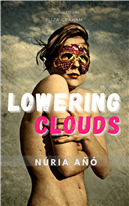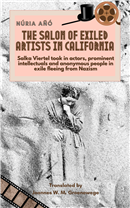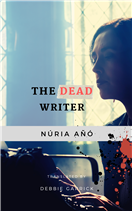
Created 11/31/2016. Last updated 06/22/2017
© 2016 Núria Añó. All rights reserved.
SHANGHAI INSPIRATION FOR VISITING WRITERS | Yao Minji
Ten writers from around the world are in Shanghai for two months to discuss all facets of the writing craft and to be inspired by new experiences. The 9th Shanghai Writing Program, hosted by the Shanghai Writers’ Association, aims to add a different perspective to writers’ views of the world in general and of China in particular. This year, the writers in residence, who come from Spain, Denmark, Israel, Argentina, New Zealand, Poland, Russia and the United States, are from all walks of life. They include an artist, a corporate manager, a teacher and a police officer, most of whom write as a sideline. For some, it was their first trip to Asia. Yao Minji asked the participants to share their journey to becoming a writer, their favorite themes and subjects, and their impressions of Shanghai, among other topics.
NÚRIA AÑÓ, SPAIN
Q: Do many Catalan authors write in the Catalan language? What about you? Do you write in both Spanish and Catalan or only in Catalan?
A: Many Catalan writers do write in Catalan. In my case, I write in Catalan because it’s my mother tongue and I feel more comfortable when it comes to selecting words. But depending on the topic, I do also write in Spanish.
In the end, languages are only a tool for communication. I use my writing to discuss socially relevant subjects, to inform and to condemn injustices. Most of my characters are antiheroes and they are probably the most important in my work.
Q: Why antiheroes?
A: I prefer to be on the side of losers, the misunderstood or lonely people rather than writing about the strong and powerful.
Q: You are currently working on a biography of Salka Viertel. Tell us what it is about this actress and screenwriter that drew you to write her biography?
A: As I learned about her, I saw just how fascinating a woman she was. In the 1930s, she was well known as a specialist on scripts for Greta Garbo, but she is much more than that.
In exile in California she created a salon that welcomed many prominent European artists, composers, film and theater directors, actors, physicians and writers who emigrated to the US, fleeing Nazism. Her house was a shelter for intellectuals, and this is what attracted me. And I love cinema and classic films, and appreciate other women’s lives.
Q: Do you consider Salka Viertel an antihero?
A: Yes, as a Jewish woman in exile in the 1930s, she is an antihero.
In Europe, she was an actress who had to leave her work and dreams. When her husband’s contract expired, she had to learn English and support him and the family for many years.
Her work as a screenwriter was closely associated with Swedish actress Greta Garbo, so much so that when Garbo retired from the silver screen, it meant the end for Viertel as well.
Shanghai Daily · Saturday, October 22, 2016 | See press clipping
Other languages
Interview with Catalan writer Núria Añó

Website of writer Núria Añó
Núria Añó is a Catalan/Spanish writer, translator and speaker at international conferences, where she usually talks about literary creation, the cinema, cities or authors like Elfriede Jelinek, Patricia Highsmith, Salka Viertel, Alexandre Dumas fils, Franz Werfel or Karen Blixen. She has shown her work at the following universities and institutions: University of Lleida (UdL), Tunis University, University of Jaén (UJA), International University of Andalucia (UNIA), Spanish National Research Council (CSIC-Madrid), The Sysmän Kirjasto Library in Finland, The Shanghai Writers’ Association (SWA), Fudan University in China, The East China Normal University, Sinan Mansion, The Instituto Cervantes in Shanghai, the Conrad Festival in Poland, the Massolit Bookshop, Bar Bazza and the Instituto Cervantes in Krakow along with other libraries and secondary or higher education establishments. She is also a member of various juries at international competitions. Some of her works—including novels, short stories and essays—have been published and translated into Spanish, French, English, Italian, German, Polish, Chinese, Latvian, Portuguese, Dutch and Greek.
Her first published novel Els nens de l’Elisa (Omicron, 2006) was awarded third prize in the 24th Ramon Llull Novel Award, one of the most prestigious awards for Catalan literature, awarded by Editorial Planeta. L’escriptora morta ([The Dead Writer, 2020] Omicron) was published in 2008; Núvols baixos ([Lowering Clouds, 2020] Omicron) in 2009; La mirada del fill (Abadia) in 2012; El salón de los artistas exiliados en California ([The Salon of Exiled Artists in California], 2020), a biography on Jewish screenwriter Salka Viertel.
Her writing centres around the characters’ psychology, often through the use of anti-heroes. The characters are what stands out most about her work; they are more relevant than the topic itself. With an introspection, a reflection, not sentimental, but feminine, she finds a unique balance between the marginal worlds of parallels. Her novels are open to a wide variety of topics, they deal with important social and current themes like injustice or lack of communication between individuals. The basic plot of her novels does not tell you everything there is to know. By using this method, Añó attempts to involve the reader so that they ask their own questions to discover the deeper meaning of the content.
Núria won the 18th Joan Fuster Prize for Fiction Ciutat d’Almenara, fourth place for international writing at the 2018 Shanghai get-Together and has been awarded with prestigious international grants: NVL (Finland, 2016), SWP (China, 2016), BCWT (Sweden, 2017), IWTCR (Greece, 2017), UNESCO City of Literature (Poland, 2018), IWTH (Latvia, 2019) and IWP (China, 2020). For a more detailed background of the author, visit her webpage www.nuriaanyo.com/en-lectur.html.
Literary Prizes/ Awards:
2020. Awarded at International Writing Program in China.
2019. Awarded at International Writer's and Translators' House in Latvia.
2018. Fourth prize of the 5th Shanghai Get-together Writing Contest.
2018. Selected for a literary residence in Krakow UNESCO City of Literature, Poland.
2017. Awarded at the International Writers' and Translators' Center of Rhodes in Greece.
2017. Awarded at the Baltic Centre for Writers and Translators in Sweden.
2016. Awarded at the Shanghai Writing Program, hosted by the Shanghai Writer's Association.
2016. Awarded by the Culture Association Nuoren Voiman Liitto to be a resident at Villa Sarkia in Finland.
2004. Third among the finalists for the 24th Ramon Llull Prize for Catalan Literature.
1997. Finalist for the 8th Mercè Rodoreda Prize for Catalan Short Stories.
1996. Awarded the 18th City of Almenara Joan Fuster Prize for Fiction.
ESPAÑOL La escritora muerta, Nubes bajas, La mirada del hijo, El salón de los artistas exiliados en California, Los niños de Elisa
FRANÇAIS L'écrivaine morte, Le regard du fils, Nuages bas, Le salon des artistes exilés en Californie, Les garçons d'Elisa
SVENSKA Exilkonstnärernas salong i Kalifornien
PORTUGUÊS O Olhar do Filho, A Escritora Morta, Nuvens baixas, O Salão dos Artistas Exilados na Califórnia, Os Meninos de Elisa
NEDERLANDS De dode schrijfster, De blik van de zoon, De salon van artiesten in ballingschap in Californië
DEUTSCH Der Blick des Sohnes, Tiefe Wolken, Die Tote Schriftstellerin, Der Salon der Exilkünstler in Kalifornien
ITALIANO La scrittrice morta, Nuvole basse, Lo sguardo del figlio, Il salone degli artisti esiliati in California
ELLINIKA To vlemma tou yiou, I nekri singrapheas, To salóni ton exóriston kallitechnón stin Kalifórnia, Hamila sinefa, Ta paidia tis Elisas
The Dead Writer, Núria Añó (ebook) READ AN EXCERPT
Amazon.com (Kindle)
Amazon.co.uk (Kindle)
Amazon.ca (Kindle)
Amazon.com.au (Kindle)
BOOKS IN ENGLISH
Lowering Clouds, Núria Añó (ebook) READ AN EXCERPT
Amazon.com (Kindle)
Amazon.co.uk (Kindle)
Amazon.ca (Kindle)
Amazon.com.au (Kindle)




